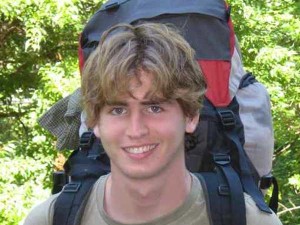January 03-2014

. . . just like bin Laden
A college student detained at Philadelphia Airport after Transportation Security Administration (TSA) officials discovered he was carrying Arabic language flashcards has lost his bid to sue the federal agents who detained him.
Nicholas George, then 19, alleged that the TSA agents violated his First and Fourth Amendment rights when they arrested him as he tried to board a flight from his Philadelphia home to his senior year at Pomona College in California in 2009. George was double majoring in physics and Middle Eastern studies.
In addition to the flashcards, George was carrying a book that was critical of US interventions abroad.
According to Chief Judge Theodore McKee’s ruling, despite the fact that George clearly had the right to carry the flashcards, the TSA agents were “at the outer boundary” of justifiability in detaining him.
In addition to everyday words and phrases like “day before yesterday,” “fat,” “cheap,” and “pink,” the deck of flashcards also contained words and phrases like “bomb,” “terrorist,” “explosion,” and “to target.” George said the vocabulary was based on what would be found in the daily media.
Judge McKee believed those words and phrases warranted further investigation, even though George told the officers that he was using the flashcards in order to learn Arabic for a study abroad program in which he would be traveling to Ethiopia, Egypt and Sudan.
“I want to serve my country using my Arabic language,” George told CNN. “And it just seems crazy to me that for that I was arrested and treated like a criminal.”
George said that after the first two officers discovered the cards, they swabbed his person and cellphone for explosive residue, and then called a supervisor. George alleged that when the supervisor arrived, she subjected him to an aggressive interrogation that included the following exchange included in the court decision.
TSA AGENT: Do you know who did 9/11?
GEORGE: Osama bin Laden.
TSA AGENT: Do you know what language he spoke?
GEORGE: Arabic.
TSA AGENT: Do you see why these cards are suspicious?
The case recalled instances during the Cold War in which some students of Russian were taken into custody by law enforcement officers. In one instance the “suspicious” student was a midshipman at the US Naval Academy where he was studying Russian at US government expense.
While the female TSA agent was questioning George, a Philadelphia police officer entered the room, handcuffed him and led him through the terminal to the Airport Police Station, where he was detained for an additional four hours. George claimed that no officers questioned him during that time, nor did any inform him as to why he had been arrested.
Eventually, two agents from the FBI Joint Terrorism Task Force arrived and questioned him, asking whether he was a member of a “pro-Islamic” or “communist” group, or whether he had ever met “anyone in his travels who was overtly against the US government.” After questioning him for 30 minutes, the FBI agents determined George was not a threat and released him.
Neither the TSA nor the FBI disputed George’s account of the facts, and Judge McKee ruled that “George’s factual allegations do not establish that [the TSA and FBI agents] violated a Fourth Amendment right.”
“Once TSA Officials were satisfied that George was not armed or carrying explosives, much of the concern that justified his detention dissipated. However, it did not totally vanish or suggest that further inquiry was not warranted,” he wrote. “Thus, the actions of the TSA Officials corresponded to the level of concern raised by the flashcards.”
The case was focused largely on the Fourth Amendment, which protects citizens from unreasonable searches and seizures. The Fourth Amendment states: “The right of the people to be secure in their persons, houses, papers, and effects, against unreasonable searches and seizures, shall not be violated, and no Warrants shall issue, but upon probable cause, supported by Oath or affirmation, and particularly describing the place to be searched, and the persons or things to be seized.”
The courts have ruled since 9/11 that airport searches for weapons and explosions are justifiable given the threat. George did not question that but argued that once the TSA agents found no weapons or explosives he should have been free to get on his flight and all the actions based on the flashcards were illegal.
A lower court had ruled in George’s favor. In last week’s ruling, the 3rd Circuit Court of Appeals in Philadelphia reversed that lower court ruling.
Chief Judge McKee, writing for a three-judge Circuit Court panel, said the law enforcement officials’ actions were reasonable, and George can’t pursue claims against the individual agents. George’s cases against Philadelphia police officers, including the officer who put him in handcuffs, and the federal government aren’t affected by the ruling.
McKee said George clearly had the right to have the materials, but “it is simply not reasonable to require TSA officials to turn a blind eye to someone trying to board an airplane carrying Arabic-English flashcards with words such as ‘bomb,’ ‘to kill,’ etc.”
He wrote: “Rather, basic common sense would allow those officials to take reasonable and minimally intrusive steps to inquire into the potential passenger’s motivations.”
The court’s holding cautioned that George’s detention was at the “outer boundary” of what is permissible under the Fourth Amendment, and “much of the concern that justified his detention dissipated” after agents determined he wasn’t carrying weapons or explosives. But the additional inquiry remained warranted, McKee wrote.
“Suspicion remained, that suspicion was objectively reasonable given the realities and perils of air passenger safety,” the ruling concluded.
